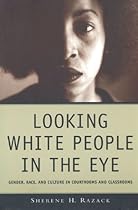Read Looking White People in the Eye: Gender, Race, and Culture in Courtrooms and Classrooms by Sherene Razack Online
Download ^ Looking White People in the Eye: Gender, Race, and Culture in Courtrooms and Classrooms PDF by ^ Sherene Razack eBook or Kindle ePUB Online free. Looking White People in the Eye: Gender, Race, and Culture in Courtrooms and Classrooms In contrast, Razack addresses how non-white women are viewed, and how they must respond, in classrooms and courtrooms. Seen as victims of their own oppressive culture who must be pitied and rescued by white men and women, non-white women cannot then be seen as subjects. It offers powerful arguments for why it is important to examine who are the saviours and who are the saved, and what we must do to disrupt these historical relations of power.. Examining the discussion of equity issues in the cla

| Title | : | Looking White People in the Eye: Gender, Race, and Culture in Courtrooms and Classrooms |
| Author | : | |
| Rating | : | 4.56 (609 Votes) |
| Asin | : | 0802078982 |
| Format Type | : | paperback |
| Number of Pages | : | 272 Pages |
| Publish Date | : | 2017-02-09 |
| Language | : | English |
Highly Relevant What a fascinating book. Most fascinating to me was interrogation of terms such as "freedom," "rights," and and "power."Razack writes, "'Rights rhetoric,' beginning with the idea that each person is free to pursue his or her own interests, masks how historically organized and tightly constrained individual choices are. the autonomous man or woman so dear to liberal thinkers has no connection to others. His or her freedom is not a relation; one man's freedom to choose his destiny is not seen to depend on another being . "an excellent complement to anti-oppressive analyses of popular media" according to Steve Parr. as outlined in razack's introduction, this book fills a much needed void in anti-oppression literature by analyzing power structures in the law and education fields. the arguments are compelling, the evidence thorough, and the tone uncompromising. depending on where you're at with your politics and capacity for self-reflection, this can either be a very exciting and inspiring book, or cause for defensiveness / guilt-ridden naval gazing. regardless of what you're response is, i'm confident you'll have one, because razac. "Analytical, interesting and even easy to read" according to A Customer. After seeing the two poor reviews given to this book, I had to add my two cents. This is an excellent book that covers a fairly wide range of topics related to discrimination and identities including gender-based persecution refugee hearings, problems with storytelling in multicultural settings and conceptions of disability. Razack writes from an anti-imperialist, antiracist and feminist standpoint, and her tone is challenging. I suspect that those two who gave this book bad reviews are uncomfortable with admitting tha
In contrast, Razack addresses how non-white women are viewed, and how they must respond, in classrooms and courtrooms. Seen as victims of their own oppressive culture who must be pitied and rescued by white men and women, non-white women cannot then be seen as subjects. It offers powerful arguments for why it is important to examine who are the saviours and who are the saved, and what we must do to disrupt these historical relations of power.. Examining the discussion of equity issues in the classroom and immigration and sexual violence cases in the courtroom, she argues that non-white women must often present themselves as culturally different instead of oppressed. This book makes clear why we must be wary of educational and legal strategies that begin with saving 'Other' women. In this book Sherene Razack explores what happens when whites look at non-whites, and in particular at non-white
Sherene H. Razack is a professor in the Department of Social Justice at the Ontario Institute for Studies in Education, University of Toronto.
Bringing the insights (but not the jargon) of postcolonial theory to her search for "a theory of difference that accounts for the violence in the lives of women and our complicity in it," Razack asks us to look, and look again, at the practices in courtrooms and classrooms in which we are all enmeshed. She offers no easy answers, only the discipline of refusing to look away. This is true, in part, because, Razack shows, we must first admit our own complicity in the oppression of those whom we are trying to understand or help.' (Richard Delgado, Charles Inglis Thomson Professor of Law at the University of Colorado at Boulder and author of The Rodrigo Chronicles and Critical Race Theory: The Cutting Edge.)'Sherene Razack's gaze is deep and searching. Questioning received and well-intentioned notions of activism in classrooms, courtrooms and women's
Download Looking White People in the Eye: Gender, Race, and Culture in Courtrooms and Classrooms
Download as PDF : Click Here
Download as DOC : Click Here
Download as RTF : Click Here
